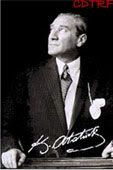Montenegro is divided over vote to separate from Serbia
Montenegro is divided over vote to separate from Serbia
By Alex Todorovic in Belgrade
(Filed: 22/05/2006)
The Balkan state of Montenegro voted yesterday on whether to become independent from Serbia and write the final chapter in the break-up of the former Yugoslavia.
The result is likely to be close as the country is deeply divided between those loyal to Serbia and those hoping that independence will catapult this beautiful country on the Adriatic coast into the European Union and more prosperous times.
 |
The State Electoral Commission said turnout in the first nine hours of voting was 85 per cent, the highest since Montenegro first staged democratic elections in the 1990s.
"Montenegro is cut in half," said Predrag Bulatovic, the leader of Montenegro's pro-Serb bloc, as he cast his ballot. "After the vote, we must reconcile and think about Montenegro's European future."
The republic's pro-independence prime minister, Milo Djukanovic, said he was convinced "we have a clear majority that will lead Montenegro to its independence".
The latest opinion polls indicate that a slight majority of Montenegrins will vote for independence.
But it is not clear whether the pro-independence camp will collect at least 55 per cent of "Yes" votes - the threshold set by the European Union for Montenegro to split from Serbia. The EU, fearing violence, set the threshold in an effort to avoid an unconvincing majority for such a crucial decision.
The referendum has sharply divided Montenegro's 620,000 citizens along ethnic, geographic and generational lines. Around 80 per cent of the population are ethnic Serbs, torn between loyalty to Belgrade and a belief that Montenegro can move forward faster alone.
The minority of mainly Slavic Muslims and Albanians favour independence.
 |
Those who live along Montenegro's scenic coastline are more likely to support the split. That region has seen a sharp improvement in its standard of living, boosted by foreign investment and tourism revenue.
Residents of Montenegro's northern and poorer mountainous region, bordering Serbia and Bosnia and Hercegovina, are more likely to vote in favour of the state union.
Serbia and Montenegro share a close history.
Many famous Serbian leaders were from Montenegro by heritage, from "Blackface George" who led the first Serbian uprising against the Turks in 1804, to the recently deceased Serbian strongman Slobodan Milosevic, whose father was born in northern Montenegro.
The most famous "Serbian" romantic poet of the 19th century, Bishop Petar Petrovic Njegos, was from Montenegro but referred to himself as a Serb.
Generations of Montenegrins have been educated in Belgrade, and Montenegrins have a long history of assuming leading positions in Serbian companies and the public sector.
Given this intertwining history, many Serbs are either baffled or even hurt that Montenegrins now want to break away.
Serbian prime minister Vojislav Kostunica has called on Montenegrins to remain joined to Serbia.
With passions running high, there have been fears that whatever the outcome, there could be violence after the results are announced.
The Bosnian war started after the former republic voted for independence in 1992, when its minority Serbs rebelled against the pro-independence government.
Daily Telegraph

0 Yorum:
Yorum Gönder
Kaydol: Kayıt Yorumları [Atom]
<< Ana Sayfa